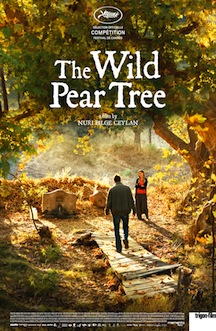Direction: Nuri Bilge Ceylan
Country: Turkey
About Dry Grasses is the ninth feature film by acclaimed art-house Turkish director Nuri Bilge Ceylan (Once Upon a Time in Anatolia, 2011; Winter Sleep, 2014), whose signature blend of languid yet observant storytelling has earned him cult status. In this mature and quasi-philosophical wintry chamber piece, Ceylon delves into the vain hopes, fixations, and frustrations of Samet (Deniz Celiloglu), a guileful middle-aged teacher yearning to escape the isolation, suffocation, and alienation caused by working in a remote eastern Anatolian village for four years.
With an anguishing melancholy penetrating every frame, the director crafts a skillfully complex Chekhovian fresco that disconcerts by steering the narrative into unexpected directions. The topics of aloofness and vacillation of the soul expand, coexisting with fragments of entrenched politics, cynicism, betrayal, individualism, moral considerations, cold romanticism, and lost illusions. Some of them blur the lines between good and evil.
Ceylan, who has an unerring knack for arresting imagery, opts for austere shots, capturing the vast and desolate snowy fields and pallid grey skies with profound intensity, increasing tension. The sensitive material and harsh environment find a perfect match in his hands, translating into a disturbing yet compelling portrait of egotistic utopia.
Recondite emotional stimuli surface intermittently with lucidity in each character, often without the need for words. Ceylan exposes subtle dark spots of the human soul in a quietly meditative study that reveals the intricate intelligence of its design. While his heavy cinema and stretched-out narratives may not appeal to everyone, About Dry Grasses denotes his continued evolution in terms of staging, elasticity, and tone.





